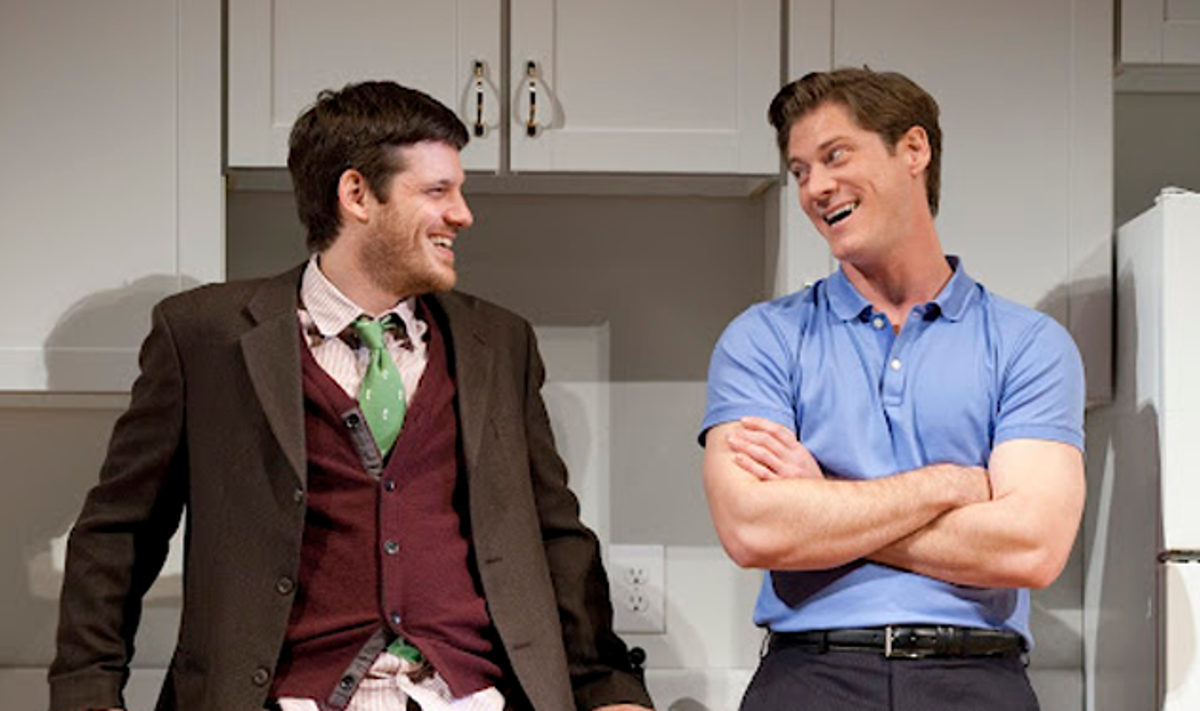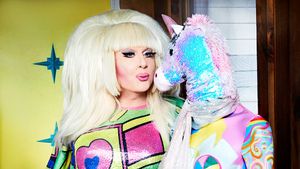Michael Esper as Curtis & Gregory Wooddell as Brian in 'The Lyons' / Photos by Carol Rosegg
Pull up a chair and meet the Lyons--Rita the matriarch (Linda Lavin), Ben her husband (Dick Latessa), and their children Lisa (Kate Jennings Grant) and Curtis (Michael Esper). As Ben lies dying in a hospital bed, the rest of the clan gathers and if you're expecting a poignent reunion, you've come to the wrong deathbed, friends. Not so say the slings and arrows being fired--and landing with a startling amount of accuracy--in Nicky Silver's play The Lyons are anything short of wince-worthy and completely hysterical. Rita and Ben's harried, neurotic son, Curtis, who just so happens to be gay, is particularly ripe for expolitation--but tread lightly because, like any good gay son, he's got razor-sharp teeth and will bite if attacked. And Esper's Curtis takes a decidedly dark and creepy turn in an unexpected moment at the top of the second act (that we don't want to spoil for anyone).
We chatted up the actor about how he's managed that onstage journey every night to win such superlative reviews.
Out: How would you describe your character, Curtis?
Michael Esper: I love him very much. He's a troubled, complicated person. I mean troubled makes him sound disturbed, and I don't think he's disturbed. He has a lot of internal obstacles to overcome, thanks to his family. He's come up with certain strategies to be OK in those circumstances. He's terrified of people, he feels awful about himself, and he's a terribly lonely person, but he's doing the best he can.
How much does a character's sexuality affect how you approach a role?
Well, sexuality is definitely a part of it -- especially the way he feels about himself. The way he grew up, the way his father feels about him being gay. The different things he tried to make Curtis straight, that stuff. I always try to be as specific as possible when I'm playing a character. There's not one type of person, gay or straight. I think about it in relation to his specific circumstances. How he was shaped by his family, how that shaped his view of his sexuality.
Is it surprising to have both extremes--both humor and drama--in one play? I don't want people to think this is a four-hour tragedy--it's really, really funny.
It's thrilling to play. It's definitely not Long Days Journey Into Night. Nicky's writing is so fun because it's right on the edge of two opposing emotions. The challenge is to find them and to balance and honor them truthfully. Nicki once said of his plays--and he didn't say it about The Lyons, so I don't know if he feels it about this one--that it's like the Three Stooges, except every once in a while someone gets poked in the eye and it really, really hurts.
As someone who's lived in the New York, or nearby, for most of your life, does this play feel like an accurate portrayal? How true to life is this?
It feels very real to me. It feels like a very real family. Certain things definitely ring true, even in my family--though not the crueler things. I think there's something very essentially New York about this family, but not in a stereotypical way.
How is it to be in a play versus a musical--even one as crazy as American Idiot?
They're very different monsters. I haven't done that many musicals, so when I did American Idiot, it was much more demanding in certain ways. It required a lot more of a certain type of energy--though I was sitting on a couch almost the entire time. Everyone else who had to move around the whole time probably wanted to punch me in the face. But that show was such a rock concert--when the audience showed up they gave so much back. There was such a high level of adrenaline and the energy oft the music, it was almost like a constant scene partner who did the heavy lifting for you.
Over the course of a run you go through phases. One week you love it, the next week not so much. It can be easy for a while, and then hard, and then it comes back again. It comes on in waves.
How was it moving the show from Off-Broadway to Broadway?
The play really opened up in an amazing way. I don't know exactly what that is, but part of it is probably the time away. Taking time away can be incredibly beneficial. Also the space itself benefits the work. I think we actually feel more like a family now, and we're a bit freer. Open is the word I keep wanting to use for some reason.
Has the audience changed?
There's more of them now.
And they're paying more.
Yes they are. But there's such a variance from night to night. Each audience is so particular. Every night is different, we're different and they're different. It's a conversation with them, so it's always interesting to see how they react and take it in. The play's exciting that way. It's both hilarious and dangerous. Funny and dark. It's amazing to feel a group of people figure that out and take that ride.
Is there something you want the audience to walk away with when the show is over?
I think what the play is saying is really beautiful--that people's capacity for connection and to reach out is so great, even despite great obstacles. I find a lot of hope in the play. For all the funny, petty cruelties that the family puts itself through, in the end the play is incredibly loving. Everyone sort of gets what they need, even if its in an unlikely form, they find a way to be happy in the end. That's incredibly moving to me. Especially because the play doesn't compromise in any way. Everyone has to find their way independently. For example, something that on one level seems really mean actually inspires my character to start making steps to become happier. It ends on a hopeful note.

























































































